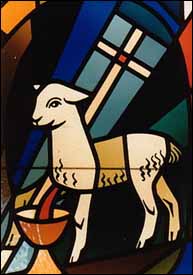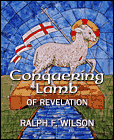
|
Old Testament
New Testament
Gospels
Acts
Paul's Letters
General Letters
Revelation
Topical Studies
Beginning the Journey (for new Christians). en Español

|
Old Testament
New Testament
Gospels
Acts
Paul's Letters
General Letters
Revelation
Topical Studies

|
Home
Bible Studies
Articles
Books
Podcasts
Search
Menu
Donate
About Us
Contact Us
FAQ
Sitemap
Day 9. Washed in the Blood of the Lamb (Revelation 7:13-14)
 Stained glass showing Lamb of God with vexillum and chalice, from chapel that used to be part of a convent (now a Baptist church and school complex) in El Cajon, California. |
The great, innumerable, ethnically-diverse, white-robed multitude is offering loud praises to the Lamb and the one seated on the throne. But who are they?
"13 Then one of the elders addressed me, saying, 'Who are these, clothed in white robes, and from where have they come?' 14 I said to him, 'Sir, you know.' And he said to me, 'These are the ones coming out of the great tribulation. They have washed their robes and made them white in the blood of the Lamb.'" (Revelation 7:13-14)
We learn two things about these worshippers: (1) they have come out of the "great tribulation," and (2) they have been cleansed by "the blood of the Lamb." Let's explore these.
The Great Tribulation
The "tribulation" is one of those key timeline elements for interpreters of Revelation. If you're "pre-trib," that means that you believe that Jesus returns prior to the Great Tribulation. Or maybe you're "mid-trib" or "post-trib." I won't even attempt to settle the controversy here! We're in a devotional mode, not exegetical.
But let's look further. The phrase "great tribulation" (ESV, NIV, KJV), "great ordeal" (NRSV) is two words, megas, "great," and thlipsis, literally, "pressing, pressure," in the New Testament, "trouble that inflicts distress, oppression, affliction, tribulation."37 We see periods of tribulation in several places in the New Testament. Jesus speaks of one of these -- perhaps this period that Revelation refers to.
"Then there will be great tribulation (thlipsis), such as has not been from the beginning of the world until now, no, and never will be." (Matthew 24:21)
The churches when the Book of Revelation is written are going through tribulation (thlipsis) in the form of persecution (Revelation 1:9; 2:9-10).
Some periods mentioned in Revelation involve especially intense persecution for the church. In particular, the three-and-a-half-year period mentioned in Revelation 11 and elsewhere is a time when the church proclaims the gospel while being persecuted. This is a time when the dragon makes war against the church (Revelation 11:7; 12:17) and is seemingly victorious over it. That is probably the "great tribulation" that our passage is referring to, a time when there are a great many martyrs in heaven waiting for the End of all things (Revelation 6:11). This may be the same group that we see in our passage.
Washed in the Blood of the Lamb (Revelation 7:14)
"These are the ones coming out of the great tribulation. They have washed their robes and made them white in the blood of the Lamb." (Revelation 7:14)
Now we see a curious and paradoxical image -- of robes being made white after being washed38 in blood. It is obviously symbolic rather than literal. We see a hint of this in the last chapter of Revelation.39
"Blessed are those who wash their robes,
so that they may have the right to the tree of life
and that they may enter the city by the gates." (Revelation 22:14)
What does "washing one's robe" mean? Is this some kind of works-righteousness? I don't think so. It is probably a metaphor of repentance. People realize that they are sinners, symbolized by unclean garments (Zechariah 3:3-5), so they find a way to cleanse themselves, their garments, by washing (1 Corinthians 6:11; Ephesians 5:26-27; Zechariah 13:1). Repentance and seeking salvation are not "works" in the Pharisaic sense. Rather, they are the outworking of faith in Jesus.
What makes this image striking is not the idea of washing to cleanse from sin, but washing in blood to make white. It is a startling paradox. It underscores the point that the blood Jesus shed for our sins is able to cleanse us from sin and make us righteous in God's eyes -- symbolized by the white robes, robes of righteousness.40
The Apostle John tells us,
"If we walk in the light, as he is in the
light,
we have fellowship with one another,
and the blood of Jesus his Son cleanses us from all sin." (1 John 1:7)
Some branches of the Christian church are embarrassed by this imagery of being cleansed by the blood. They see it as representing a primitive view of atonement by blood sacrifice, and find it repugnant -- perhaps because they are several generations removed from the farm, where butchering animals is a common part of life. They seek a more "refined" theory of the atonement. But I am convinced that Jesus' blood-sacrifice for our sins is clearly the primary theory of the atonement found in the New Testament!
If you can receive it, our verse emphasizes the wonder and miracle of salvation.
"They have washed their robes
and made them white in the blood of the Lamb." (Revelation 7:14)
Christ's sacrifice for you and me can remove even the most stubborn stain of sin. It is powerful! There is nothing you have done that cannot be forgiven through the cross of Christ. Hallelujah.
So I encourage you to embrace this paradox of being washed in the blood. If you do, you'll understand the joy we have in full salvation in Jesus.
In 1899, Lewis E. Jones, a Christian worker and former classmate of evangelist Billy Sunday, wrote these words and set them to music, exploring our verse and rejoicing in it.
"Would you be free from the burden of sin?
There's power in the blood, power in the blood;
Would you o'er evil a victory win?
There's wonderful power in the blood.
There is power, power,
wonder-working power
In the blood of the Lamb
There is power, power, wonder-working power
In the precious blood of the Lamb
Would you be free from your passion and pride?
Come for a cleansing to Calvary's tide.
Would you be whiter, much whiter than snow?
Sin stains are lost in its life giving flow."41
 Available in PDF, and Kindle formats, |
Dear reader, let me ask you directly. Have you "washed your robes in the blood of the Lamb?" Is your religion part of your family's tradition or have you personally come before the Lord in repentance and asked him to cleanse you? Today would be an excellent day for you to do just this!
Prayer
Father, thank you for full forgiveness, for complete cleansing from even our most stubborn stains! I pray that great tribulation will not be necessary for us to come to you for cleansing, but that we might come early and often for your forgiveness, O Lamb of God who takes away our sins. In Jesus' blessed name, we pray. Amen.
Day 9 Meditation (Revelation 7:13-14). Why do you think
this image is so jarring -- being made white by washing in blood? What are we
supposed to see in this? Why do you think this imagery is embarrassing to some?
https://www.joyfulheart.com/forums/topic/1883-day-9-washed/
Endnotes
(References and Abbreviations)
[37] Thlipsis, BDAG 457, 1.
[38] "Wash" is plynō, "to wash something (other than a part of the body), wash" (BDAG 832, 1).
[39] The prophecy of the messianic descendant of Judah who washes his garments in wine, the blood of grapes (Genesis 49:11b), probably doesn't refer to atonement from sin. Rather, the washing garments in wine is more likely a poetic way describing the golden age of the Messiah -- wine is so abundant you can wash your clothes in it (Derek Kidner, Genesis: An Introduction and Commentary (Tyndale Old Testament Commentary; Inter-Varsity Press, 1967), p. 219; cf. Victor B. Hamilton, The Book of Genesis, Chapters 18-50 (New International Commentary on the Old Testament; Eerdmans, 1995), p. 662).
[40] Isaiah 61:10; 52:1; Psalm 132:9, 16; Revelation 3:4-5; 19:8, 14, 18.
[41] Lewis E. Jones (1899) was a YMCA worker and general secretary.
Copyright © 2025, Ralph F. Wilson. <pastor![]() joyfulheart.com> All rights reserved. A single copy of this article is free. Do not put this on a website. See legal, copyright, and reprint information.
joyfulheart.com> All rights reserved. A single copy of this article is free. Do not put this on a website. See legal, copyright, and reprint information.

